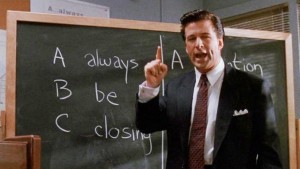Always Be Conversing

He was so young!
In the 1992 movie, Glengarry Glen Ross, Alec Baldwin played a very hard-nosed sales manager determined to teach a bunch of rookies how to sell. He used intimidation, fear, stress, and money as motivators. He didn’t believe in being nice. He believed in closing.
Baldwin also introduced a term that I’ve heard many times since: Always Be Closing or ABC. The idea is simple – you’re always looking for prospects, qualifying them, moving them through the sales process, and closing them. Then you start over. You’re like a shark – always moving, always eating.
Always Be Closing is associated with pushy, high-pressure sales tactics. You might find them in use at car dealerships or time-share condo conventions. We’re all familiar with them and we all profess to hate them.
Now what about nonprofits? Is Always Be Closing an appropriate technique for raising funds for a nonprofit organization? I don’t think so. For me, nonprofit fundraising is all about relationships. It’s about building for the long run, not closing in the short term.
So I’ve created a new ABC for non-profits: Always Be Conversing. A conversation, of course, has two parts: talking and listening. Always Be Conversing suggests that we’re always ready to talk about our nonprofit organization (NPO) and listen to our constituents’ needs. By conversing with constituents, friends, and our broader network of acquaintances, we build relationships. Over time, those relationships allow us – quite naturally – to ask for donations.
Always Be Conversing also implies that we actively seek out conversations. To create rich conversations, we need to prepare ourselves. Here are some pointers:
- Always have a story – people love stories – they’re easy to understand, relatable, and memorable. When you tell a story, you’re not being a pushy sales person. Rather, you’re building relationships, awareness, and interest. Tip: focus on outputs, not inputs. If your NPO donated a million dollars for scholarships last year, that’s an input. It’s an interesting fact but not a story. On the other hand, if you can describe how your scholarships changed people’s lives, that’s the output of your investment. It’s also a memorable story that most people will be eager to hear.
- Use conversation starters – how does anyone know that you’re passionate about your NPO? How does anyone know that you’re a source of information and assistance? The simplest way is to wear some identification. If you wear a lapel pin or a brooch or a jacket with your NPO’s logo on it, people can identify you and have a conversation. It can happen at random times, so always have a story ready.
- Don’t ask, offer– my NPO is the National Multiple Sclerosis Society. When I wear my NMSS jacket to the grocery store, people frequently ask me about my connection to the Society. Then they often say, “My (wife, cousin, mother, neighbor, etc.) has MS.” I typically respond by saying, “How can I help?” As it happens, NMSS can help in a variety of ways, from insurance advice to exercise programs. But I’m also invoking the reciprocity principle – you’re more persuasive if you offer a favor before requesting a favor.
Over the coming weeks, I’ll write more about fundraising for nonprofits through story telling and relationship building. In the meantime, start telling your stories. You’ll be surprised at the impact you can have.
(My NPO is the National Multiple Sclerosis Society. If you need information about multiple sclerosis or help in dealing with it, just drop me a line. I want to Always Be Conversing).
How to get a sports car
 Want to get a sports car? Start by asking for a motorcycle.
Want to get a sports car? Start by asking for a motorcycle.
It’s a variation of a basic rule called reciprocity — as identified by Robert Cialdini in his book, Influence. Every society adheres to some form of reciprocity — it helps cement relationships. It’s useful to know that, if you do someone a favor, you’ll likely be repaid in the future.
The reciprocity principle may seem obvious. But there are many subtleties and variations. Learn three of the major variations — and how to get a sports car — in this week’s video.